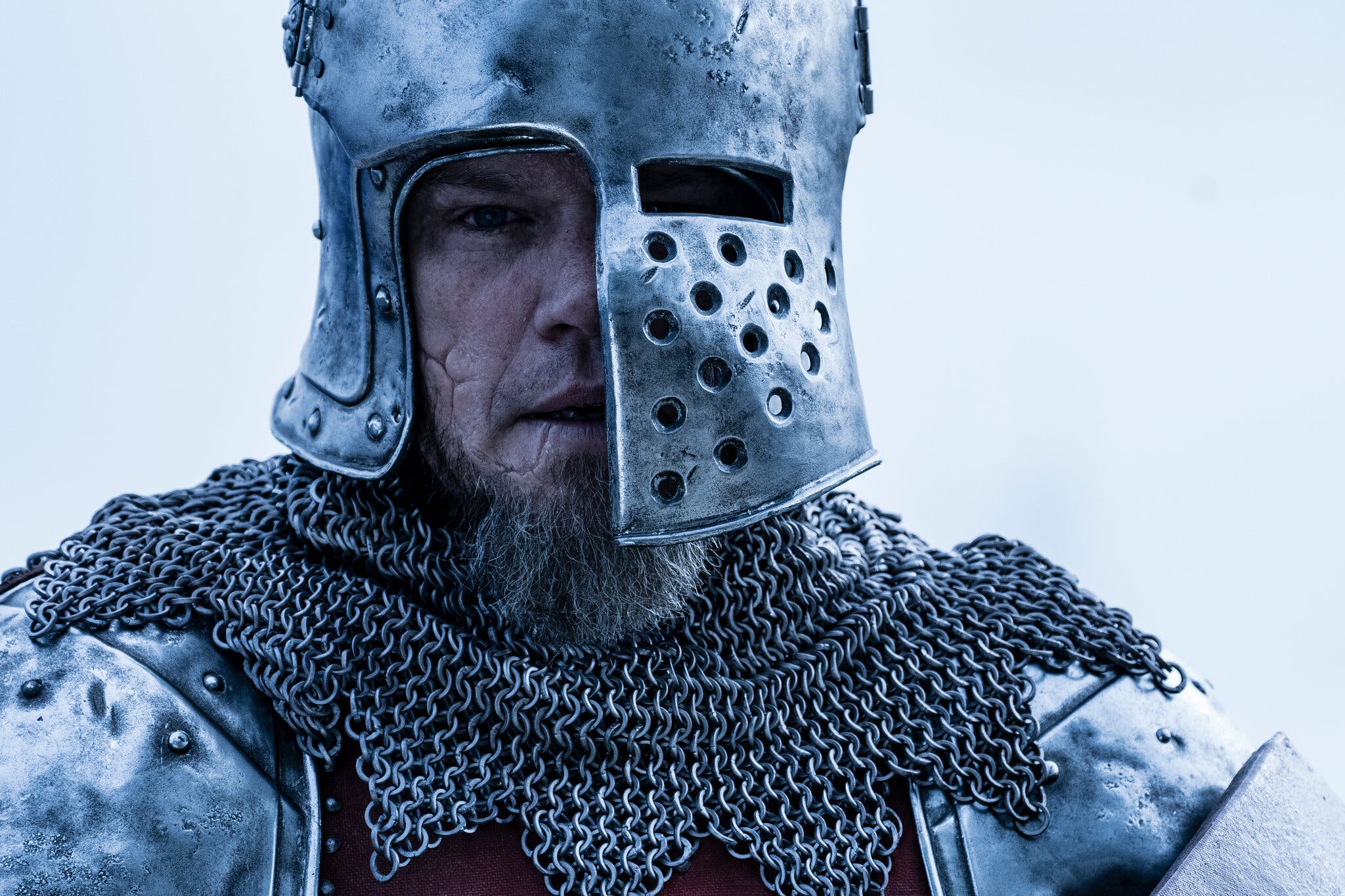
The Last Duel isn’t a subtle film. Ridley Scott’s latest—for a few weeks at least; due to a COVID-19 release delay, The House of Gucci is nipping at its heals—is a medieval #MeToo movie with a dash of Rashomon. It is pointed and pedantic. It wants you to believe women when they say they have suffered sexual assault, and it has nothing nice to say about any institution – political, ecclesial, or otherwise. It is also the most visceral movie I’ve seen in a long time. My heart was beating so hard in the film’s final act, I think I broke a rib.
The Last Duel is based on the historical events surrounding the final judicial duel ever fought in France. In 1386, two men fought each other to the death to determine guilt in a case of accused rape brought by one man on behalf of his wife. The winner was seen as justified in the sight of God and man. Screenwriters Matt Damon, Ben Affleck—who both act in the film; Damon is a French hillbilly and Affleck is hilariously foppish; Adam Driver is here too—and Nicole Holofcener structure the story as a trio of repeated tales from different perspectives about what happened. The three tellings barely contradict each other. More, they layer on cultural considerations and interpersonal dynamics that complicate the combined narrative. One perspective is absolutely privileged, that of Marguerite de Carrouges (Jody Comer, the only mature person in the film), the woman who is raped. We see the assault twice, once from the perspective of her attacker and once from her own perspective. Both scenes are horrific. It all ends with the promised duel, of course, which is also brutal.
You may think you have seen this kind of thing before – Dark Age trials presided over by misogynistic and superstitious clerics and kings and medieval knights on horseback dueling for honor. But I assure you, you’ve never seen this kind of thing done this ferociously. The Last Duel is a venomous film. It is exactly the film we should expect from the filmmaker who made Alien, Thelma and Louise, and Gladiator, but the way those films have become part of the cultural lexicon has blunted the effect of those movies. The Last Duel reminds you that the best Ridley Scott films have serrated edges. I’m not sure this is top-tier Scott—I am not inclined toward preachy movies—but it is certainly a gripping-and-ripping movie-watching experience.
I do question if the centuries of remove we have from the events depicted make this too much a metaphor and not the contemporary cultural critique it is clearly intended to be. I’ll say this though. Ridley Scott is eighty-three years old, and if I saw him striding down the street toward me, I would run. I am afraid of that man.
The Last Duel isn’t a subtle film. Ridley Scott’s latest—for a few weeks at least; due to a COVID-19 release delay, The House of Gucci is nipping at its heals—is a medieval #MeToo movie with a dash of Rashomon. It is pointed and pedantic. It wants you to believe women when they say they have suffered sexual assault, and it has nothing nice to say about any institution – political, ecclesial, or otherwise. It is also the most visceral movie I’ve seen in a long time. My heart was beating so hard in the film’s final act, I think I broke a rib.
The Last Duel is based on the historical events surrounding the final judicial duel ever fought in France. In 1386, two men fought each other to the death to determine guilt in a case of accused rape brought by one man on behalf of his wife. The winner was seen as justified in the sight of God and man. Screenwriters Matt Damon, Ben Affleck—who both act in the film; Damon is a French hillbilly and Affleck is hilariously foppish; Adam Driver is here too—and Nicole Holofcener structure the story as a trio of repeated tales from different perspectives about what happened. The three tellings barely contradict each other. More, they layer on cultural considerations and interpersonal dynamics that complicate the combined narrative. One perspective is absolutely privileged, that of Marguerite de Carrouges (Jody Comer, the only mature person in the film), the woman who is raped. We see the assault twice, once from the perspective of her attacker and once from her own perspective. Both scenes are horrific. It all ends with the promised duel, of course, which is also brutal.
You may think you have seen this kind of thing before – Dark Age trials presided over by misogynistic and superstitious clerics and kings and medieval knights on horseback dueling for honor. But I assure you, you’ve never seen this kind of thing done this ferociously. The Last Duel is a venomous film. It is exactly the film we should expect from the filmmaker who made Alien, Thelma and Louise, and Gladiator, but the way those films have become part of the cultural lexicon has blunted the effect of those movies. The Last Duel reminds you that the best Ridley Scott films have serrated edges. I’m not sure this is top-tier Scott—I am not inclined toward preachy movies—but it is certainly a gripping-and-ripping movie-watching experience.
I do question if the centuries of remove we have from the events depicted make this too much a metaphor and not the contemporary cultural critique it is clearly intended to be. I’ll say this though. Ridley Scott is eighty-three years old, and if I saw him striding down the street toward me, I would run. I am afraid of that man.

Elijah Davidson is Co-Director of Brehm Film and Senior Film Critic. Find more of his work at elijahdavidson.com.
In the beginning was the word in The French Dispatch, Wes Anderson’s long release-delayed ode to the literary magazine ideal.